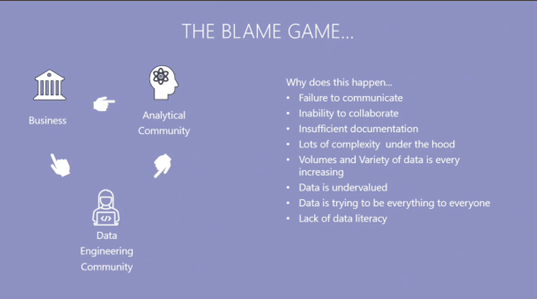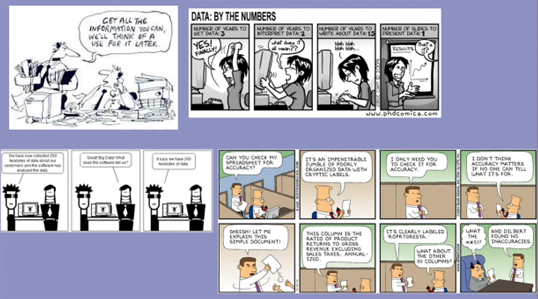Data does not have to be a 4 letter word with Lisel Engelbrecht
Executive Summary
This webinar highlights the challenges, importance, and opportunities related to data organisation, consumption, analytics, and management. Challenges include disjointed concepts and data literacy, while importance lies in understanding and loving your data and leveraging it for business growth. Automation and data platforms can pose challenges; Executives must balance data management and analysis risks and rewards. Lastly, opportunities for career growth in data management abound, and those looking to monetise data skills should focus on self-service frameworks and value data.
Webinar Details
Title: Data is not a 4 letter word with Lisel Engelbrecht
Date: 01 April 2022
Presenter: Lisel Engelbrecht
Meetup Group: Big Data & Data Science
Write-up Author: Howard Diesel
Contents
Challenges with Data Organization and Consumption
Challenges and Disjoint Concepts in Working with Big Data
Challenges in Data Documentation, Data Valuation, and Marketing Campaign Tracking
Challenges in Data Literacy and the Value of Self-Service Frameworks
Importance of Data Analysis in Business
Challenges of Integrating Automation and Data Platforms with Excel
The Challenges and Risks of Data Management and Analysis
Importance of Managing Data in Data Science and AI
Importance of Understanding Data in a Relationship
Importance of Understanding and Loving Your Data in Data Science and Machine Learning
Importance of Leaving Ego Aside in Problem Solving and the Potential of Data Transformation
Lack of understanding and appreciation of data
Advice for a Junior Data Analyst and Ways to Monetize Data Skills
Challenges with Data Organization and Consumption
The struggles faced by professionals in various industries regarding data analysis and business solutions are highlighted. Based on interviews with marketing, IT, and tech professionals, a marketing chart released in March 2021 identified common issues such as disorganised data, limited storage availability, and slow data analytics processes. These challenges are not new and have been a part of the data journey for a while. Lisel Engelbrecht emphasises the importance of the human factor in data organisation and the need for proper understanding and appreciation of data. She provides an example highlighting the significance of data format and its role in data analysis, which she shared from her experience of joining Standard Bank's data science community.
Figure 1 What brings out the 4 letter word's when working or using data? ... "I don't trust the data"
Challenges and Disjoint Concepts in Working with Big Data
The community has been accustomed to the traditional warehouse construct and specific metadata. However, there have been issues in comprehending big data, resulting in a blame game within the community. Additionally, disagreements have arisen about what to call the same thing, depending on the technology used. This has led to a failure to communicate effectively and collaborate among stakeholders to make data valuable. The complexity of big data includes various data storage systems (warehouse, lake, reservoir), technical and business metadata, and different data models (logical, conceptual). The community must align strategies and collaborate effectively to overcome the challenges of working with big data.
Figure 2 Challenges and Disjoint Concepts in Working with Big Data. The Blame game
Challenges in Data Documentation, Data Valuation, and Marketing Campaign Tracking
Insufficient documentation and turnover in companies can lead to ineffective data documentation and knowledge capture. This can be particularly challenging given the increasing volumes and variety of data companies must manage and utilise. Unfortunately, data is often undervalued and poorly monetised, leading to a lack of understanding of its true cost. To address this, the concept of ABC costing can be applied to valuing data. Additionally, inaccurate tracking and linking marketing campaigns to customers is a frustrating issue for marketers that should be addressed to improve marketing effectiveness.
Challenges in Data Literacy and the Value of Self-Service Frameworks
Lisel highlights several challenges that organisations face in utilising data effectively. While data is a valuable resource, over-reliance on it as a solution for all problems can be inefficient and costly. Additionally, the actual cost of cloud computing and egress costs must be understood. Data literacy is also a significant challenge, as a lack of understanding can hinder the effective utilisation of self-service frameworks. Handholding and more guidance may be necessary to address this issue to bridge the data literacy gap. Additionally, the human value chain involved in data must be managed alongside technical implementations, and ongoing struggles in data literacy will continue to create job opportunities for professionals.
Figure 3 Challenges in Data Literacy and the Value of Self-Service Frameworks
Importance of Data Analysis in Business
The importance of improving data analysis skills and seeking new perspectives is highlighted. It is crucial to have clear objectives and a solid understanding of the problem to ensure practical data analysis. Complaints about incorrect or slow dashboards point to the need for proper data modelling and design, even in tools like Power BI and Click View. Lisel emphasises the significance of data modelling. While a small team with strong data manipulation skills can succeed, scaling up and lacking expertise can pose challenges. Daan notes that recognising the importance of user demand and accessibility is crucial.
Challenges of Integrating Automation and Data Platforms with Excel
Daan highlights the use of tools such as R or MATLAB to automate and manage data platforms at banks. However, integrating these platforms with Excel requires significant additional work, resulting in potential user problems. Additionally, user resistance is high if the change in work processes is seen as too drastic. This often leads to difficulties in the full implementation of new solutions. The ratio of data engineers to analytics professionals is often imbalanced, which results in limited self-service capabilities and challenges in maintaining data quality. Furthermore, estimating the costs of transitioning to cloud services is a common concern for many organisations.
The Challenges and Risks of Data Management and Analysis
Cloud solutions can be complex and costly, potentially leading businesses to failure. However, leaders are beginning to recognise that cost isn't the only factor to consider when moving to the cloud; scalability and data access speed are also important. Cloud data management allows quicker scaling and the ability to spin off environments as needed, even though cloud solutions can be expensive. They offer the potential for reaching customers more quickly, making businesses more effective and agile. However, data costs and latency issues remain concerns in South Africa due to the region's unavailability of all needed solutions. Data management requires a special touch, similar to a relationship, and it is crucial to get the core of data management right before implementing advanced concepts like data science and AI. Examples of failures such as IBM Watson's unsafe treatment recommendations, Microsoft's AI chatbot corrupted by trolls, and Apple's 3D facial recognition concept compromised by a 3D-printed face with added eyeballs highlight this importance.
Importance of Managing Data in Data Science and AI
Lisel highlights the importance of proper data management in data science, machine learning, and AI. The recent incident where Amazon's facial recognition AI misidentified 28 US Congress members, including Michelle Obama, brought attention to correct data handling. Similarly, Amazon's AI for recruitment was biased against women due to improper training by engineers. Due to the risks involved, Lisel prefers to focus on plain analytics rather than AI and machine learning. Additionally, she expresses concern about some people's lack of interest or understanding of data. However, Lisel emphasises the need to love and value data, comparing the process of falling in love with data to stages in a romantic relationship. The initial meeting with data involves selling the potential of what data can do, followed by curiosity, interest, and infatuation, leading to understanding and engagement. The hope of what data can achieve is used as a selling point, and building a relationship with data involves getting to know and engage with it. Collaboration and communication with stakeholders in data analysis are crucial for quality outcomes.
Figure 4 Importance of Managing Data in Data Science and AI. The acronym "y-o-d-a" stands for "your own data" or "your data”
Importance of Understanding Data in a Relationship
Understanding someone in a relationship and relating it to understanding data is crucial. Lisel emphasises the significance of knowing triggers and thought processes to make accurate assumptions and avoid bad ones. Lisel outlines the importance of negotiating with the business to determine the minimal viable product and how this leads to the enlightenment of what data can do. She also highlights the need to understand data quality issues and flaws to avoid disappointment. Lisel emphasises the importance of embedding and selling the importance of data to the business to make them love the data as it belongs to them, not the data community.
Importance of Understanding and Loving Your Data in Data Science and Machine Learning
The importance of loving and appreciating one's data is emphasised to properly conduct data science and machine learning. The acronym "y-o-d-a" stands for "your own data" or "your data”. Lisel shares their experience of being blamed for data issues, which turned out to be their own data. This concept of loving data is not unique, as others have explored similar ideas. She invites engagement and questions related to big data and data science. The impact of educating people on the importance of data and the challenges of the human element in data management are discussed. Difficulties determining ownership and responsibility for data and its effects on the process are also mentioned. The question of how long it will take to solve people-related challenges in data management in large organisations is raised.
Importance of Leaving Ego Aside in Problem-2Solving and the Potential of Data Transformation
Lisel stresses the importance of keeping ego aside in meetings to solve problems and effectively avoid blame games. She also underscores the value of educating small groups to make them advocates for change within the organisation. The session on the value chain of data led to an "aha" moment. Lisel notes that solving data-related issues within the organisation she works for, within 18 months with around 5,000 people, is possible, provided ego is set aside. Having "skin in the game" and clear value communication are necessary for engagement. While a deep understanding of data may take time, an appreciation for data can be developed quickly. The data and AI strategy initiated by the crown prince of Saudi Arabia showcases the country's commitment to data transformation, and lawyers in Saudi Arabia are learning about data, highlighting the importance of a single vision for change in organisations.
Lack of understanding and appreciation of data
The importance of understanding and appreciating data cannot be overstated. Planning and prioritising around data is crucial to provide value throughout the entire value chain. This involves teaching the team to say "no" to demands that do not align with the company's strategy or provide value.
Patricia has proposed creating a Chief Data Officer (CDO) position. Whether or not a company needs a CDO depends on its strategy and level of maturity. A CDO can help with governance and data ownership and utilise data to create more products and services. It's essential to find the right fit for the individual, considering the various generations of CDOs and their evolving roles.
Advice for a Junior Data Analyst and Ways to Monetize Data Skills
Advice for individuals seeking to advance their careers in data analysis includes understanding the business problems data can solve, building practical experience, and connecting with others in the industry. For junior data analysts, learning about the challenges faced by product owners of data is recommended. For those having trouble finding a job, developing a data engineering concept and sharing it on LinkedIn can help connect with potential employers. Finally, for individuals like Lelo and Farron, sharing work on platforms like LinkedIn can lead to connections with universities or companies that may aid in career development.
If you would like to join the discussion, please visit our community platform, the Data Professional Expedition.
Additionally, if you would like to be a guest speaker on a future webinar, kindly contact Debbie (social@modelwaresystems.com)
Don’t forget to join our exciting LinkedIn and Meetup data communities not to miss out!





